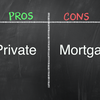Investor Insights on Private Mortgages

In today’s economic climate, having varied investments has become a crucial step in maintaining financial stability and flexibility. Given the chaotic and volatile nature of the stock market , private mortgages have emerged as a compelling investment option for individuals seeking alternative avenues to grow their wealth. As traditional investment strategies face uncertainties, more investors are exploring the potential of private mortgages. In this guide, we will delve into the dynamics of private mortgages, analyzing the risks and rewards associated with this investment vehicle.
Private Mortgages as an Investment Vehicle: Risk and Reward Analysis
If you are considering taking on a private mortgage as an investment vehicle, the first step is to weight the perceived risks against the potential rewards you may be privy to.
Potential Rewards:
- Higher Returns: One of the primary attractions of private mortgages is the increased potential for higher returns you receive, compared to traditional investment options. Private mortgage investors typically receive interest rates that far exceed those offered by banks or other financial institutions. This enhanced yield can contribute significantly to the overall profitability of your investment.
- Steady Income Stream: Private mortgages can provide a steady income stream through regular interest payments. This predictable cash flow can be particularly appealing if you are seeking reliable sources of income, especially in comparison to the more volatile returns associated with other investment vehicles.
- Asset Appreciation: As private mortgages are often secured by real estate, you may benefit from potential property value appreciation. In a growing real estate market, the underlying collateral can appreciate over time, contributing to the overall profitability of the investment.
Risks to Consider:
- Default Risk: Perhaps the most significant risk associated with private mortgages is the potential for borrower default. If the borrower is unable to meet their repayment obligations, you may face financial losses. Thorough due diligence on the borrower's creditworthiness and financial stability is crucial to mitigate this risk.
- Market Fluctuations: Real estate markets can experience fluctuations due to economic conditions, interest rate changes, or local factors. These market fluctuations can impact property values, affecting the collateral's worth. You should be prepared for the possibility of a decline in property values, which could impact your overall return on the investment.
- Lack of Liquidity: Private mortgages lack the liquidity of more traditional investments like stocks or bonds. Unlike publicly traded securities, selling or liquidating a private mortgage investment can be a complex and time-consuming process. You should be aware of this lack of liquidity and consider it in their overall portfolio strategy.
- Interest Rate Risk: Changes in interest rates can affect the attractiveness of private mortgages. If interest rates rise, the fixed interest rate on existing loans may become less competitive. Conversely, falling interest rates could impact the potential returns for new private mortgage investments.
- Legal and Regulatory Risks: Private mortgage investments are subject to legal and regulatory risks. Changes in regulations, zoning laws, or legal disputes related to the property can impact the investment's performance. You can somewhat mitigate these risks by remaining informed about the evolving legal landscape.
Diversifying Your Investment Portfolio with Private Mortgage Opportunities
Diversification often serves as a pillar of any great investment strategy, and private mortgages present a unique opportunity to leverage this skill. By adding private mortgages to your overall investment portfolio, you can spread your risk across different asset classes and potentially enhance your overall returns.
Private mortgages may provide a level of stability during market downturns, that more liquid investments (stocks, bonds, etc.) may be unable to provide. Real estate, often the underlying asset in private mortgages, has historically shown resilience, making it an attractive option for investors looking to diversify their holdings and mitigate risks associated with market volatility. Furthermore, private mortgages can offer a source of steady income, making them appealing for investors seeking reliable cash flow. The secured nature of these loans, backed by real estate collateral, may provide a degree of capital preservation even in challenging economic conditions.
Navigating the Private Mortgage Market: Expert Tips for Savvy Investors
- Entering the private mortgage market requires a strategic approach and a comprehensive understanding of the industry. Here are some tips you may want to consider if you are an investor looking to navigate this market successfully:
- Before committing to any private mortgage investment, conduct thorough due diligence. Evaluate the borrower's creditworthiness, assess the property's value, and understand the terms of the loan agreement. A well-researched approach can minimize potential risks.
- Even within the realm of private mortgages, diversify your investments. Consider different types of loans, such as residential or commercial mortgages, to spread risk. Diversification can help protect your portfolio from adverse events affecting a specific segment of the real estate market.
- Establishing a conservative Loan-to-Value ratio can mitigate the impact of property value fluctuations. A lower LTV ratio provides a cushion against potential declines in property values, reducing the risk of financial losses.
- Keep a close eye on real estate market trends and economic indicators. Understanding the broader market conditions will enable you to make informed decisions and adjust your investment strategy accordingly.
Private mortgages offer investors an alternative path to building wealth, but success in this arena requires careful consideration of risks and rewards. By diversifying your portfolio with private mortgage opportunities and following expert tips for navigating the market, you too can harness the potential benefits of this unique investment vehicle while managing associated risks effectively. As with any investment, staying informed and making well-informed decisions is key to achieving long-term financial success, and our expert broker team is here to guide you. Our Clover Mortgage team can help you develop a plan to begin pursuing this investment asset-class and arm you with the knowledge you need to succeed. Contact Clover Mortgage to book a free consultation today!
People also search
FAQ
Is investing in private mortgages worth it?
Investing in private mortgages can be worth it for certain investors, especially those who are willing to conduct thorough due diligence, manage risks effectively, and have a longer investment horizon. However, it's crucial to carefully assess your own financial situation, risk tolerance, and investment objectives before deciding if private mortgages align with your overall strategy. Consulting with financial professionals or advisors who specialize in real estate and private mortgage investments can provide personalized insights based on your specific circumstances.
Why do people get private mortgages?
The choice to obtain a private mortgage over a AAA-lender mortgage can mean different things to different homebuyers. There is no single formula for success, nor one singular motivation. Typically, borrowers find that private mortgages may offer more flexibility in terms compared to traditional banks. Borrowers and lenders can negotiate terms that suit their specific needs, such as customized repayment schedules. While private mortgages often come with higher interest rates compared to bank mortgages, private lenders may be more willing to work with borrowers who have non-traditional income sources or credit histories that don't meet traditional bank standards. Finally, private mortgage transactions may have quicker approval processes than traditional banks. This can be advantageous for borrowers in situations where a speedy closing is necessary.
Is a private mortgage better than a bank?
Compared to a private mortgage, bank mortgages have a number of advantages and disadvantages:
One of the biggest advantages of a bank mortgage is that banks typically offer lower interest rates compared to private lenders. This can result in lower overall borrowing costs for the borrower. Furthermore, bank mortgages often come with longer loan terms, leading to more manageable monthly payments for the borrower. There are also an increased degree of legal and administrative protections for the borrower. Bank mortgages are subject to regulations that aim to protect consumers. Borrowers benefit from standardized terms and transparent lending practices.
On the flip side, one major disadvantage is that banks maintain strict qualification criteria, and borrowers with lower credit scores or non-traditional income sources may face challenges in securing approval. Furthermore, banks may have lengthier approval processes compared to private lenders, potentially delaying the closing of a real estate transaction. Finally, banks may have less flexibility in negotiating loan terms, as their offerings are often standardized to comply with regulatory requirements.





